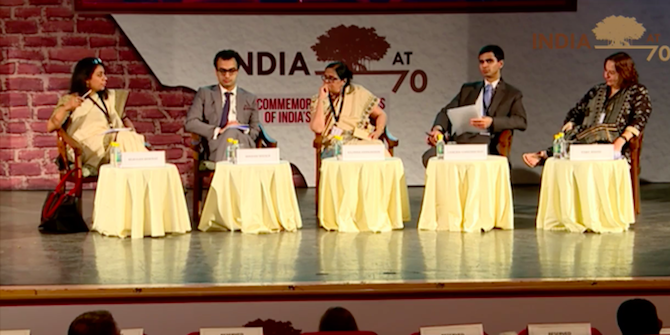Rohit Sinha and Saurabh Gupta point to citizen-led initiatives that could help bridge the trust deficit between India’s political elite and the electorate.
Some of the most successful political engagements between citizens and politicians start from a microcosm. Yet sometimes the most earnest approach by politicians to involve citizens does not result in a concrete engagement. One wonders why it has become so difficult for the political class to engage voters without resorting to sectarianism or sops. Are Indian voters not yet mature enough to collectively articulate their grievances to impact electoral outcomes? Or is there a general social mistrust rising among voters?
 According to the World Values Survey, the number of Indians who said they trusted others fell from 38.9 per cent in 2001 to 20.7 per cent in 2006. The political scientist Francis Fukuyama wrote that, “a widespread distrust in society, imposes a kind of tax in all forms of economic activity, a tax that high-trust societies do not have to pay.” One can argue the theoretical logic of such a statement, but it does offer insights into the current stagnation of the Indian voter-politician interaction.
According to the World Values Survey, the number of Indians who said they trusted others fell from 38.9 per cent in 2001 to 20.7 per cent in 2006. The political scientist Francis Fukuyama wrote that, “a widespread distrust in society, imposes a kind of tax in all forms of economic activity, a tax that high-trust societies do not have to pay.” One can argue the theoretical logic of such a statement, but it does offer insights into the current stagnation of the Indian voter-politician interaction.
To be fair, the Indian government has done exceedingly well to ensure that official documents are publicly accessible, including online. Government records across ministries are being digitised and state governments have allocated sufficient funds to electronically apply and track delivery of public services and documents of public business such as auctions and tendering. The contact information of all public officials is also available on websites.
At a local level, municipal corporations (MCs) have pursued different initiatives catering to the kind of population they deal with. The MCs in Delhi regularly conduct a programme called Bhagidari, which literally means ownership. Under the scheme, citizens and public officials meet to jointly discuss problems and find solutions to urban governance issues. Online public grievance redressal systems have also been made operational by most MCs in urban areas.
But these measures have not reaped the intended objectives. Widely advertised campaigns by the MCs of cities such as Mumbai and Chennai have been met by a poor response from citizens. These local government-led initiatives require more innovation to work more efficiently and productively. One solution may be a parallel system of governance that is not temporary and is prioritised by citizens themselves.
Not surprisingly, an increasing number of citizen-led initiatives aimed at informing the voter have sprung up across major Indian cities in the run-up to parliamentary elections in May. These initiatives are seeking to connect with the estimated 150 million first-time voters who will be eligible to participate in the upcoming polls, many of them urban, middle-class youngsters.
Harnessing the power of social media and the internet, motivated individuals and organisations have begun to engage political leaders and citizens on a common platform. Chennai city also ran a campaign called the CallforChange Campaign. A 20-day pilot experiment was launched to test the viability of using online tools and Interactive Voice Response (IVR) to engage citizens in the process of local governance. It encouraged citizens to highlight local problems and simultaneously share solutions to the same. Interestingly, a voting system enabled citizens to vote on the most pressing issues to be taken up first.
Similarly, GrassRoute India, a youth-run organisation, has been actively involved in connecting citizens with representatives across party lines. Through the use of Google hangouts and Twitter conversations, the group has managed to stir debates on pressing issues. Founded less than a year ago, the organisation has already submitted a report to the Chief Minister of Maharashtra on a citizens’ Twitter chat with Milind Deora (Member of Parliament, South Mumbai constituency) regarding the issue of a directly elected mayor for Mumbai.
Another online platform, iForIndia.org, allows citizens to rate public representatives on several criteria, including basic service provision (electricity availability, primary health, education etc.), governance and administration (law and order, disaster management etc.), reputation (corruption, religious harmony or secularism, etc.) and economic growth (job creation, development projects etc.). The exercise is validated to ensure the voter’s authenticity, and so a quick glance of the ratings usefully indicates the representative’s popularity among the electorate.
The new government that enters office following elections will have to bridge the trust deficit between the political elite and their constituents, which is probably at its lowest since independence. It is undoubtedly hard to measure social trust in macroeconomic models, but the discussion needs to start somewhere. Hopefully, new citizen-led initiatives of the sort described here will continue to enlighten public representatives about their shortcomings.
About the Authors
Rohit Sinha and Saurabh Gupta are researchers at the Madras School of Economics, Chennai.
Photo credit: Bhagidari logo






